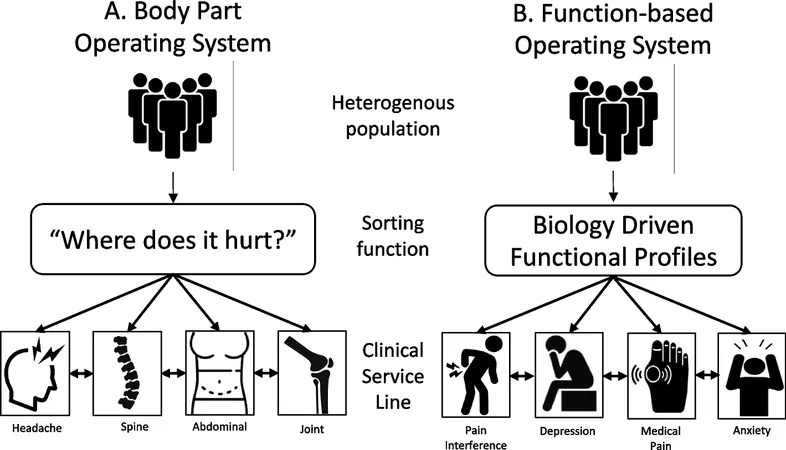
Unmasking the Mystery of Pain: A Revolutionary Approach to Understanding Chronic Pain Profiles and Disease Management
2024-12-18
Author: Siti
Exploring the Complex Interplay of Pain, Brain Structures, and Chronic Diseases
Recent research has unveiled groundbreaking findings related to chronic pain and its multifaceted nature, which may revolutionize healthcare delivery systems. Drawing from the UK Biobank—a rich database housing medical imaging, genetic data, and extensive lifestyle information from 500,000 participants—scientists are beginning to make sense of the often-elusive connections between pain experiences and brain function.
The UK Biobank offers a unique opportunity to investigate how our shared biological underpinnings influence the perception and experience of pain. Participants aged 40 to 69, amounting to over 38,000 individuals with detailed brain imaging, were examined to reveal the paths linking brain structure and pain profiles. This particular study highlighted the importance of structural brain changes associated with varying pain conditions and presented a detailed pathway towards more effective chronic disease management.
The Pain-Biology Connection: Profiling Pain Experiences
Utilizing sophisticated statistical techniques such as Partial Least Squares (PLS) analysis, researchers successfully identified four distinct pain profiles based on patient-reported experiences and structural brain data. These profiles encapsulated key symptom domains: Pain Interference, Depression, Medical Pain, and Anxiety.
1. **Pain Interference** captured the extent to which pain hampers daily activities and overall well-being. Participants expressed difficulty in mobility, self-care, and social engagement, which underpins the need for effective pain management strategies.
2. **Depression** emphasized the relationship between mood disorders and pain, suggesting that psychological factors are inherently intertwined with physical sensations. The findings indicate that treating underlying depression may alleviate certain pain manifestations.
3. **Medical Pain** gathered insights from participants suffering from chronic diseases such as osteoarthritis and diabetes. This profile highlights the necessity for a targeted approach to treat pain related to preexisting medical conditions.
4. **Anxiety**, which often intersects with both pain and depression, underscores the psychological burden of chronic pain conditions. The data suggest that addressing anxiety could be pivotal for managing pain and enhancing overall patient outcomes.
Health Implications: A Shift Towards Function-Based Care
The emerging data challenge the traditional body-part paradigm commonly employed in clinical settings. Rather than merely identifying pain in specific areas, these profiles advocate for a comprehensive view that considers the patient's overall functional status, integrating potential psychological barriers to treatment. As a result, healthcare providers may need to pivot towards a function-based operational model, focusing on optimizing patient function instead of just alleviating localized pain.
For instance, treating patients based on their dominant pain profile—whether through targeted medication management, cognitive-behavioral therapy, or lifestyle interventions—could lead to improved outcomes and a better quality of life. Notably, opioid prescriptions were primarily linked to the Pain Interference profile, revealing that pain management strategies need to be cognizant of how emotional and physical health intersect.
Harnessing the Power of Data for Future Research
The findings from the UK Biobank present a compelling case for integrating psychological evaluations into chronic pain management programs, ensuring that multidisciplinary teams address the intricate relationships between pain experiences, mood disorders, and chronic health conditions. As researchers continue to analyze the wealth of data available, there is an opportunity to refine clinical approaches that consider both the biological and psychosocial dimensions of pain.
In summary, as we deepen our understanding of pain profiles grounded in biology, we are better positioned to reshape chronic disease management. Future studies will undoubtedly benefit from these insights, paving the way for a more nuanced approach to treating patients suffering from the multifaceted challenges of pain.



 Brasil (PT)
Brasil (PT)
 Canada (EN)
Canada (EN)
 Chile (ES)
Chile (ES)
 España (ES)
España (ES)
 France (FR)
France (FR)
 Hong Kong (EN)
Hong Kong (EN)
 Italia (IT)
Italia (IT)
 日本 (JA)
日本 (JA)
 Magyarország (HU)
Magyarország (HU)
 Norge (NO)
Norge (NO)
 Polska (PL)
Polska (PL)
 Schweiz (DE)
Schweiz (DE)
 Singapore (EN)
Singapore (EN)
 Sverige (SV)
Sverige (SV)
 Suomi (FI)
Suomi (FI)
 Türkiye (TR)
Türkiye (TR)